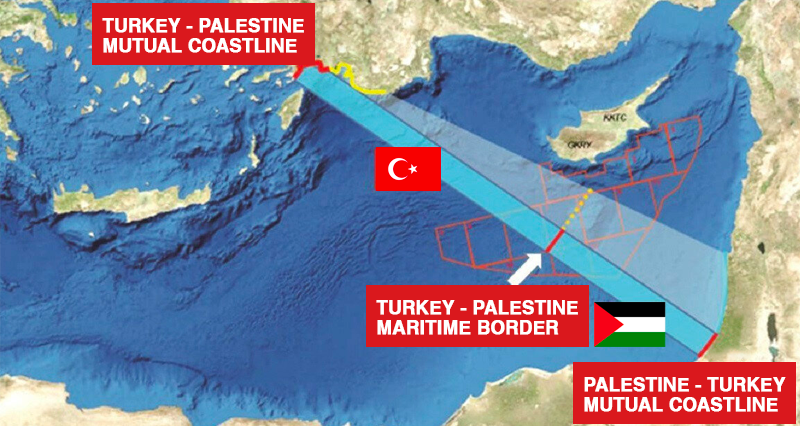A proposal, first articulated in United World International, has made it this week on Turkish newspapers headlines and caused immediate echo in Israel and Greece. The proposal is considered a so-called game-changer in the conflict between Israel and Palestine, with direct intervention of Turkey.
The Eastern Mediterranean has been a sphere of conflict already before the recent clashes, where on the one side Israel has constructed an alliance with Greece and the Greek Cypriot Administration of Cyprus in order to occupy maritime areas and energy resources. This attempt, strongly supported by the US, has pursued unilateral declarations of maritime economic exclusive zones which targeted to limit Turkey’s EEZ, the country with the longest coastline, to the Gulf of Antalya. The mentioned countries furthermore developed a military cooperation and made several naval drills, gain with the participation of the US.
Turkey has long been rejecting this unilateral approach, insisting on its and Turkish Republic of Northern Cyprus’ maritime rights. Turkey signed a mutual EEZ delimitation agreement with Libya in 2019, which caused a great protest on the opposing Israeli-Greek-US side.
Back in June 2020, the Palestinian Ambassador to Turkey, Faed Mustafa had declared to UWI his country’s disposition to sign an EEZ agreement with Turkey.
Palestine Authority and Hamas: “Ready to cooperate with Turkey”
United World Expert Onur Sinan Güzaltan took up the topic in his interview with Hamas official Basem Naim in February 2021. Naim answered the question, whether Turkey and Palestine could cooperate in the Eastern Mediterranean concerning energy resources and maritime boundaries, with the following words:
“Yes, sure… Our natural resources, not just in the sea but also in the ground and in the air are being stolen by the Israeli occupation. Part of these resources is the gas in the Mediterranean Sea.
Therefore, we are looking for any cooperation or support with the countries of the region and firstly from Turkey to get our rights in gas and other resources and to achieve our independence and sovereignty materially.”
Beginning March 2021, ret. Admiral Cihat Yaycı, who is considered to be the architect of the Turkish-Libyan delimitation agreement, confirmed to UWI that such an agreement would change the “whole equation in the Eastern Mediterranean”. But that time, Yaycı also had warned that the situation of Palestine not being a full UN-member might cause problems.
Nevertheless, a possible EEZ delimitation agreement between Turkey and Palestine has made it on the national and international agenda today.
Influential pro-government Turkish newspaper carried the cooperation that UWI and Yaycı had proposed to its headline on May 17th, titling “The Libyan Model for Palestine”.

Speaking to Yeni Şafak, Yaycı Turkey should sign a maritime jurisdiction agreement with Palestine, similar to the one it made with Libya to strengthen Palestinians’ hand in the international sphere and provide motivation for other countries to sign deals with them.
“By signing such an agreement, the Palestinian people would obtain control over a 10,200 square kilometer maritime zone, which would pave the way for them to utilize all the resources at sea,” Yaycı said.
Important contribution to Palestine’s international recognition
Such a deal would also mark the first time Palestine signs an agreement with a world power and would significantly contribute to its formal international recognition and motivate the Palestinian Authority (PA) and other states to make deals.
“Egypt should not react against it because the agreement does not interfere with the maritime jurisdiction zone it specified in the agreement with the Greek Cypriot administration,” Yaycı said in another interview to Daily Sabah.
Immediate response in the Jerusalem Post
The Israeli press reacted immediately, with Seth Frantzman publishing an article on the proposal in the Jerusalem Post. Claiming that the Yeni Şafak-Interview “had the stamp of approval of the ruling AKP party”, Frantzman warned such an agreement “would enable Turkey to contest Israel’s blockade of Gaza”.
Frantzman wrote the following on a possible EEZ delimitation agreement between Turkey and Palestine:
“This would put Israel and Turkey on a military collision course. Turkey hosts Hamas leaders and supports Hamas. Its potential plan to link Turkey and Gaza by sea would harm Israel’s gas pipeline plans with Cyprus and Greece. Turkey thus proposes using Palestinian membership in the gas forum to frustrate Israel’s relations with Greece and Cyprus and achieve Turkey’s goal.”
Greek Foreign Minister rushes to visit Israel, Palestine
Also alarmed by the proposal was the Greek government. The Foreign Minister Nikos Dendias “is rushing to Israel and the Palestinian territories on Tuesday (May 18) as part of an effort to pre-empt developments such as those that led to the Libya-Turkey maritime border memorandum”, reported the Greek newspaper Ekathimerini.
The Greek Foreign Ministry announced that the Minister would visit Israel, Palestine, Jordan and Egypt.
Stating “Athens has been alerted of a reported plan for the demarcation of exclusive economic zones between Turkey and the Gaza Strip”, the newspaper warned that such an agreement “would not only create serious problems for Greece and Cyprus, whose jurisdiction such a demarcation would violate, it would also be the final nail in the coffin of the efforts for an Israel-Turkey rapprochement.”
















Leave a Reply